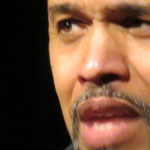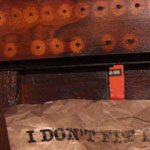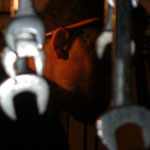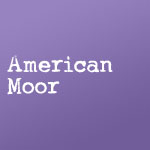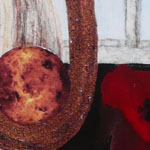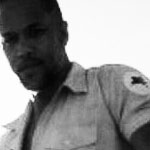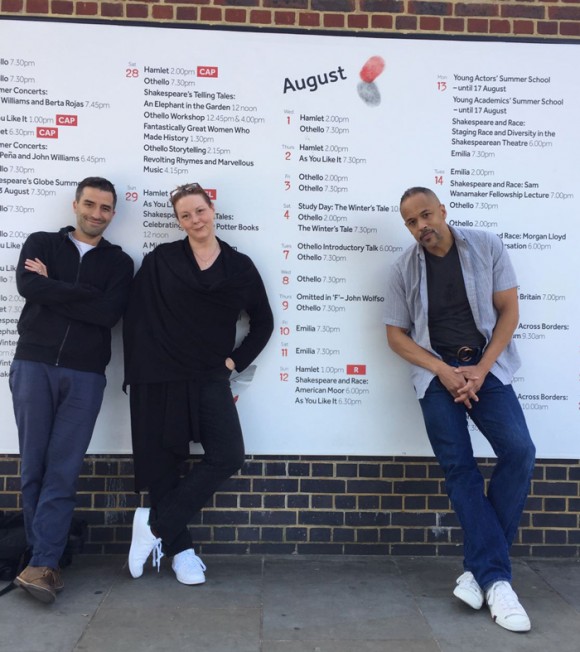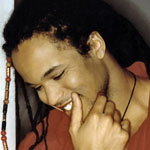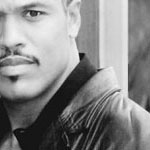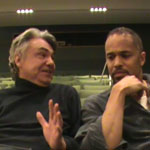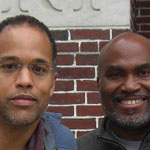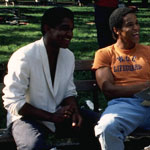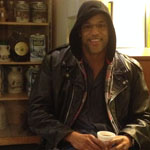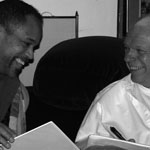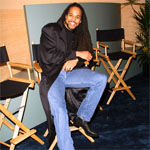London, 8/12/2018…
I had only been through once, years ago, doing a fan appearance for Gene Roddenberry’s Andromeda. And that had been for no more than a couple of days. I had never played on any of its stages, much less a stage built from a 17th century design and lit by candles in six chandeliers hung from the ceiling. It was certainly nowhere that I had ever envisioned performing American Moor. But there we were, with a rapt British audience of educators, scholars, actors, and laypeople. Odd… Wonderful, but odd… Because I suppose that this stop on the Five Destination/Five Presentation 2018/19 performance arc of American Moor never would have happened had it not been for the Shakespeare and Race Festival that The Globe Theatre was convening, and the urging of The Folger Shakespeare Library who partnered with The Globe on the event. Given the response to the performance — given the response to every single performance of American Moor that has ever been done anywhere — one would think it should be a whole lot easier to hand one’s good works to the world. But the fact remains, we would not have been on THAT stage with THIS show, ever… But we were…
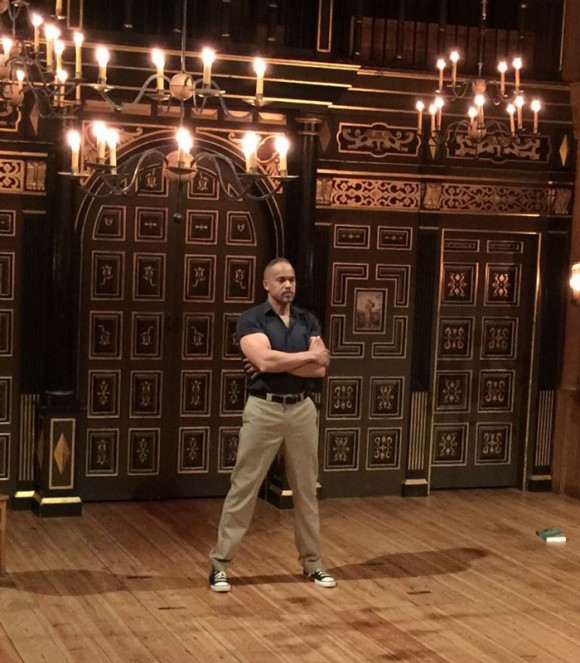 It’s quite an arc, is it not, beginning in a lecture hall on the campus of Westchester Community College? There is for me a powerful symbolism in landing upon the Sam Wanamaker stage, and playing a play about American perspectives on Shakespeare through the instrument of a black American Shakespearean. Of course, the play is about much more than that with Shakespeare, Othello, and me as its vehicles. And of course, we know by now that no one persuasion of human being responds to this work; that it is in fact about a set of human conditions that are no less present in the UK than they are in the United States. Whether one suffers under those conditions, or benefits from them, all can recognize that the play is talking about them. All that really surprised me was this moment, in this theatre, in the arc of history, for Shakespeare and me.
It’s quite an arc, is it not, beginning in a lecture hall on the campus of Westchester Community College? There is for me a powerful symbolism in landing upon the Sam Wanamaker stage, and playing a play about American perspectives on Shakespeare through the instrument of a black American Shakespearean. Of course, the play is about much more than that with Shakespeare, Othello, and me as its vehicles. And of course, we know by now that no one persuasion of human being responds to this work; that it is in fact about a set of human conditions that are no less present in the UK than they are in the United States. Whether one suffers under those conditions, or benefits from them, all can recognize that the play is talking about them. All that really surprised me was this moment, in this theatre, in the arc of history, for Shakespeare and me.
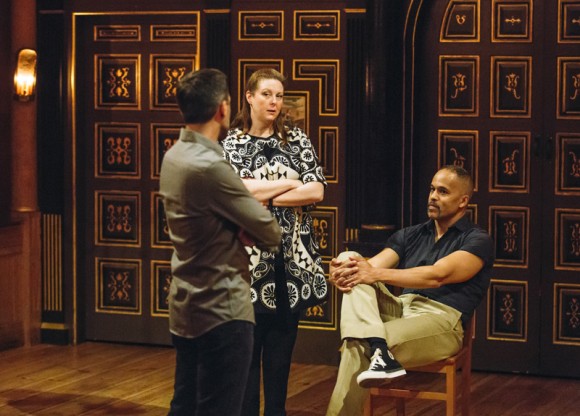 The Jacobean stage, with its candlelight and its seating arrangement offered us some challenges that resulted in some changes to how the play was played. We could not hide the director. Unlike a contemporary spaces there was no control booth where the actor could stand and view the action on stage, speaking his lines from there so that they came across to the audience as an omnipresent, disembodied voice, as the role had been originally conceived and written. We were able to experiment with the director’s actual presence in the audience during two performance at Luna Stage Theatre Company immediately before flying for London, so we weren’t totally unprepared, and it worked well in both venues. What we lost, however, was the voice as coming from within us and also without, from somewhere and nowhere; the voice born of cultural norms and narratives that no one can pin point and tell to shut up because it is as deniable as it is present.
The Jacobean stage, with its candlelight and its seating arrangement offered us some challenges that resulted in some changes to how the play was played. We could not hide the director. Unlike a contemporary spaces there was no control booth where the actor could stand and view the action on stage, speaking his lines from there so that they came across to the audience as an omnipresent, disembodied voice, as the role had been originally conceived and written. We were able to experiment with the director’s actual presence in the audience during two performance at Luna Stage Theatre Company immediately before flying for London, so we weren’t totally unprepared, and it worked well in both venues. What we lost, however, was the voice as coming from within us and also without, from somewhere and nowhere; the voice born of cultural norms and narratives that no one can pin point and tell to shut up because it is as deniable as it is present. 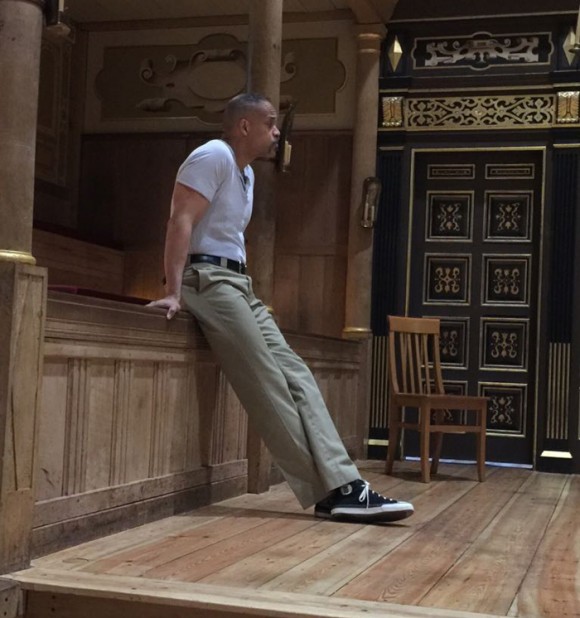 What we gained was the audience being able to make a tangible distinction between the players. It took the argument out of the abstract. Some called that a positive dramatic shift. Others — and I think I — called it reductive. But I don’t know. That IS what this #MakingTheMoor hashtag is all about; what this Five Destination/Five Presentation adventure is supposed to find us. What works best? What creates the maximum impact? What tells the entirety of the tale most authentically?
What we gained was the audience being able to make a tangible distinction between the players. It took the argument out of the abstract. Some called that a positive dramatic shift. Others — and I think I — called it reductive. But I don’t know. That IS what this #MakingTheMoor hashtag is all about; what this Five Destination/Five Presentation adventure is supposed to find us. What works best? What creates the maximum impact? What tells the entirety of the tale most authentically?
Something else that I consider a net gain was the audience presence in seating galleries on either side of the stage itself and rising up a second story above the stage floor. It was a small stage, maybe 15 feet or so across. Given the intimate audience interaction that the play seeks, the Wanamaker configuration created a pressure cooker environment that upped the energy, allowing me true face to face communion with spectators. While the play ultimately wants lighting and scenic values, I would seek the intimacy of houses like this where audiences draw close to share in what is essentially a communal experience.
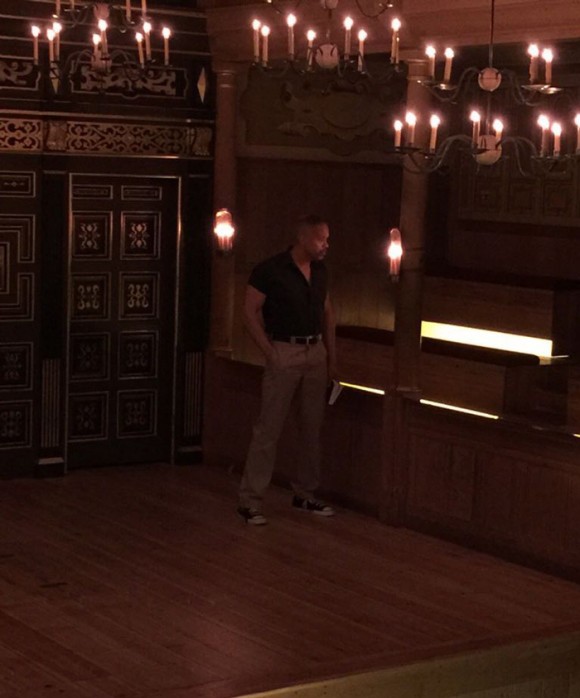 The Wanamaker and Luna Stage were both “stand on the stage and speak” performances. The Wanamaker had its atmosphere lent by candlelight, but there were no lighting effects or stage pieces to support the performance as was so in Boston, and at the Signature Theatre Center presentation in October 2018.. The script had to support itself. The great thing is that it can. It always does. Still, it has been evolving too, ever tighter, ever more succinct. These growing pains are difficult. There will need to be in the published academic version of the text a section for pages excised from the playing script that are not gone because they are not good, but because the matters upon which they treat are too big and impossibly complex to be made to fit. No part of this is easy, this play, the playing, the producing, the selling, or the issues around which the narrative revolves. But it is profoundly important, “if I do say so my damn self,” like conversations that continue about race and cultural responsibility in America and in the UK, and in the rest of the world.
The Wanamaker and Luna Stage were both “stand on the stage and speak” performances. The Wanamaker had its atmosphere lent by candlelight, but there were no lighting effects or stage pieces to support the performance as was so in Boston, and at the Signature Theatre Center presentation in October 2018.. The script had to support itself. The great thing is that it can. It always does. Still, it has been evolving too, ever tighter, ever more succinct. These growing pains are difficult. There will need to be in the published academic version of the text a section for pages excised from the playing script that are not gone because they are not good, but because the matters upon which they treat are too big and impossibly complex to be made to fit. No part of this is easy, this play, the playing, the producing, the selling, or the issues around which the narrative revolves. But it is profoundly important, “if I do say so my damn self,” like conversations that continue about race and cultural responsibility in America and in the UK, and in the rest of the world.
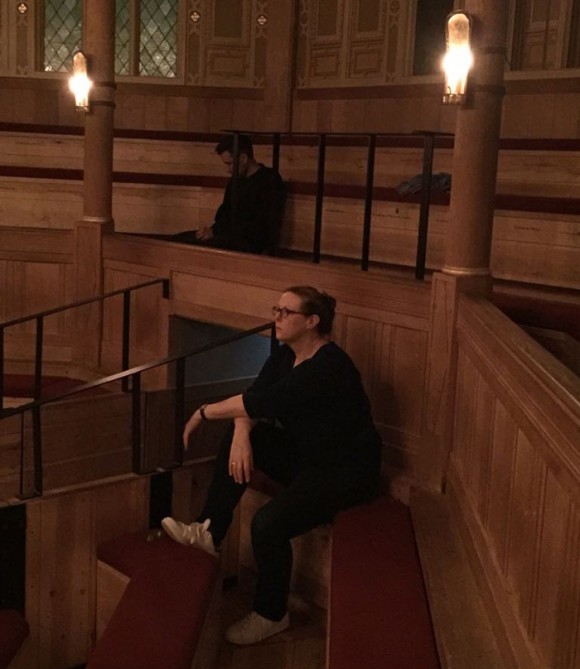 There is a part being played here that not enough people know about yet. We saw that when we played the Wanamaker playhouse at Shakespeare’s Globe, London, and talk of the performance fueled the conference for the week to follow. The English audience heard and spoke back to the play with an intensity that rivaled any of our American audiences to date. What were they hearing? And what would they have not heard had we not had the opportunity to present this to them.
There is a part being played here that not enough people know about yet. We saw that when we played the Wanamaker playhouse at Shakespeare’s Globe, London, and talk of the performance fueled the conference for the week to follow. The English audience heard and spoke back to the play with an intensity that rivaled any of our American audiences to date. What were they hearing? And what would they have not heard had we not had the opportunity to present this to them.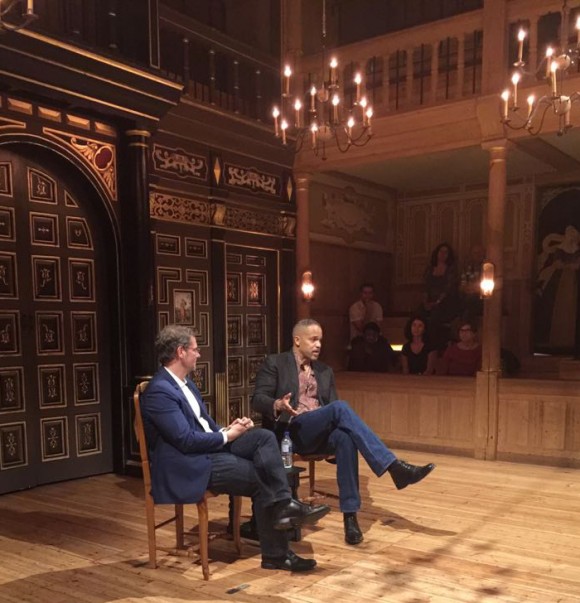
Now… onto the third destination, four performances on the campus of Mount Holyoke College and the two weeks of programming that surround them. We’ll see what changes. We’re showing up. “Mercenary actors, mercenary soldiers, that’s what we all do, and feel the holy pleasure of God in the act.”


